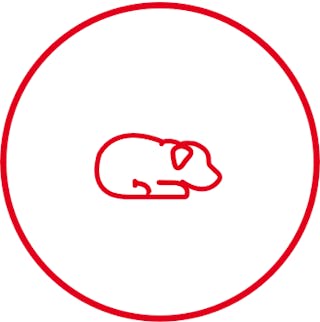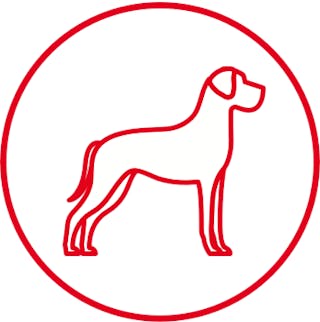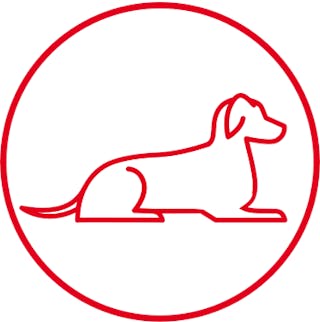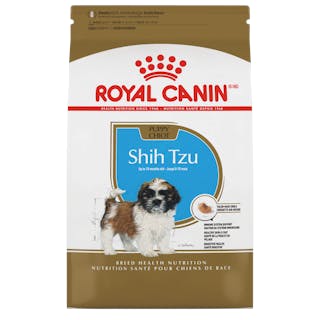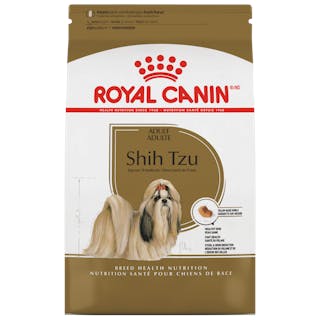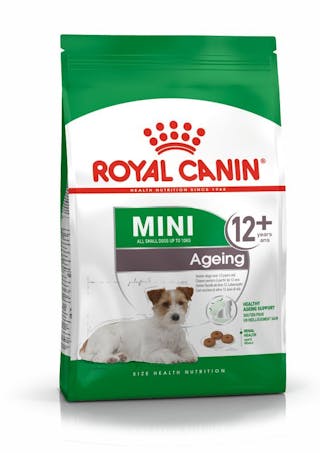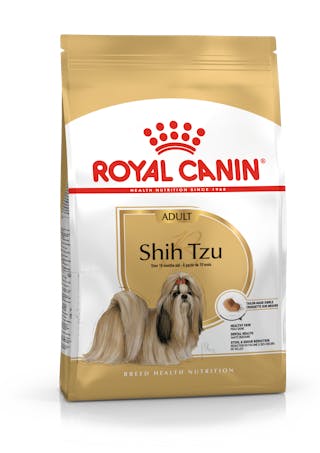
Spjöllum svolítið um Shih Tzu-hunda
Shih Tzu er svo sannarlega hundategund sem ber réttnefni, en orðið þýðir „lítið ljón“ á mandarínsku. Hundarnir eru með glæsilega, langa hárlokka og hafa yfir sér næstum konunglegt yfirbragð, enda voru þeir í fyrndinni gæludýr kínakeisara. Hins vegar má með sanni segja að skaplyndi hundanna sé allt annað en ljóna. Shih Tzu voru nefnilega ræktaðir til að vera gæludýr. Þeir eru afar blíðir heimilishundar sem mynda sterk tengsl við eigendur sína. Þeir kjósa ástríkt heimili framyfir íburð.Official name: Shih Tzu
Other names: Shittsu, tíbetskur ljónahundur, kínverskur ljónahundur, krýsantema
Origins: Tíbet/Kína

| Drooling tendencies |
|
Heitt veður |  |
| Snyrtiþörf |  |
Kalt veður |  |
| Hárlos |  |
Suited to apartment living? |  |
| Barking tendencies | Nokkuð auðveldlega |
Getur dýrið verið eitt?* |  |
| Orkuþörf (mikil, lág, í meðallagi) * | Mikil | Family Pet?* |  |
| Færni til að búa með öðrum gæludýrum |  |
* We advise against leaving pets alone for long stretches. Companionship can prevent emotional distress and destructive behaviour. Ræðið við dýralækninn til að fá ráðleggingar.
Every pet is different, even within a breed; this snapshot of this breed specifics should be taken as an indication.
For a happy healthy and well-behaved pet, we recommend educating and socializing your pet as well as covering their basic welfare needs (and their social and behavioral needs.
Pets should never be left unsupervised with a child.
Contact your breeder or veterinarian for further advice.
Öll gæludýr eru félagslynd og vilja vera í samneyti við aðra. Það er samt sem áður hægt að kenna þeim að vera ein frá ungaaldri. Leitið ráða hjá dýralækni eða þjálfara til að aðstoða við þetta.
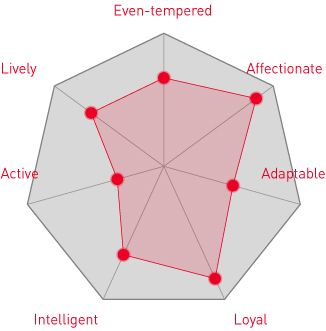

| Baby age | Birth to 2 months |
| Puppy age | 2 to 10 months |
| Adult age | 10 months to 8 years |
| Mature age | 8 to 12 years |
| Senior age | 12 to 20 years |

1/7
Fáðu að vita meira um Shih Tzu-hunda
Allt sem þú þarft að vita um þessa tegund
Arfleifð Shih Tzu er margslungin og þessi hundategund hefur ávallt haft yfir sér tiltekinn framandleika. Kínakeisarar byrjuðu að rækta tegundina og í margar aldir var hundana eingöngu að finna við kínversku keisarahirðina. Margir þegnanna töldu hundana því vera heilaga. Raunar hefur fólk borið mikla virðingu fyrir hundunum í gegnum tíðina.
Enda bera hundar af þessari fjörmiklu hundategund af sér einstakan þokka. Shih Tzu eru tryggir, ástríkir, gæfir og með eðlislæga greind. Svo er það þetta dásamlega ljónsútlit.
Shih Tzu hundar eru frægir fyrir langan og silkimjúkan feld, sem óneitanlega krefst mikillar umhirðu og snyrtingar. En það er hluti af ánægjunni við að eiga hunda af þessari tegund. Hundarnir þurfa á mjög lítilli hreyfingu að halda og eru því fyrirferðarminni en margar aðrar tegundir. Hinir smágerðu Shih Tzu vega að hámarki 8 kg og ættu því að passa inn á flest heimili.
Hundar af þessari tegund geta verið þrjóskir og það getur verið nokkuð erfitt að þjálfa Shih Tzu í fyrstu. En ef farið er gætilega og hundinum er veitt mikil hvatning verður hann yfirvegaður og hlýðinn sem fullorðinn einstaklingur. Shih Tzu-hundar eru nokkuð langlífir og geta lifað í 20 ár.
Að öllu framansögðu ætti ekki að koma á óvart að hundarnir eru einnig vinsælir hjá fræga fólkinu. Meðal þekktra nafna sem hafa átt Shih Tzu-hunda eru Mariah Carey, Beyoncé, Colin Farrell, Bill Gates og jafnvel Elísabet II drottning. Í stuttu máli þá er þetta mjög gefandi hundategund, sem svo sannarlega sæmir keisara.

2/7
Tvær staðreyndir um Shih Tzu
1. Hver er merkingin á bak við heitið?
Hefurðu velt því fyrir þér hvernig á að bera fram „Shih Tzu“? Á Vesturlöndum er orðið borið fram sem „shíd-sú“ eða „shít-sú“ (engin tengsl við blótsyrði af neinum toga). Í Kína er orðið hinsvegar borið fram „sher-zer“.
2. Smágerði blómahundurinn
Einnig má nefna hina áhugaverðu staðreynd að Shih Tzu eru stundum kallaðir „tryggðablómshundar“. Slíkt er að hluta til vegna þess að hundarnir líkjast tryggðarblómi (chrysanthemum) og tryggðablóm eru mikilvægt menningartákn í Kína.
Saga kynsins
Shih Tzu spruttu fram á sjónarsviðið fyrir 1000 árum síðan og hafa langa, litríka sögu og tignarlega arfleifð. Öldum saman voru hundar af þessari tegund einungis í eigu Kínakeisaranna og enginn utan keisarahallarinnar fékk heimild til að eignast slíka hunda.
Sumir telja að Shih Tzu-hundurinn eigi uppruna sinn að rekja til nágrannalandsins Tíbets. Sagan segir að tíbetskir munkar hafi byrjað að rækta smáhunda af þessari tegund og fært hundana Kínakeisurum að gjöf. Hvað sem öðru líður virðist Shih Tzu vera blanda tveggja tegunda af kínverskum/tíbetskum uppruna, Lhaso Apso, Pekingese og einnar tíbetskrar hundategundar í viðbót.
Shih Tzu var hjartahnoss margra keisara og lifði lúxuslífi í keisarahöllinni í margar aldir, en tegundin var hins vegar lítt þekkt utan keisarahirðarinnar. Reyndar hvarf tegundin nánast af sjónarsviðinu í upphafi 20. aldar. Frægðarsól Shih Tzu reis svo um allan heim á fjórða áratugnum og hefur tegundin haldið vinsældum sínum allar götur síðan.
Ræktunarfélög voru stofnuð í Peking og síðar meir á Englandi þar sem haldið var áfram að hreinrækta tegundina. Hundarnir urðu síðan vinsælir á fimmta og sjötta áratugnum í Bandaríkjunum og voru viðurkenndir af American Kennel Club árið 1969. Í dag er Shih Tzu vinsælasta tegund smáhunda í veröldinni.

4/7
From head to tail
Líkamseinkenni Shih Tzu-hunda
1. Head
Hausinn er breiður og rúnnaður, höfuðkúpan er hvolfd og í réttu hlutfalli við heildarstærð skrokksins.
2. Face
Nokkuð mikið bil er á milli augnanna, trýnið er stutt og ferhyrnt og eyrun eru lafandi.
3. Body
Samanrekinn og þéttur skrokkur er með beina efri línu og breiðan, djúpan brjóstkassa.
4. Tail
Skottið er með stórum skúf, sperrist hátt og liggur í sveig yfir bakið þegar hundurinn hreyfir sig.
5. Coat
Feldurinn er langur, þéttur í sér og getur verið í ýmsum litum, en margir hundar eru með hvítan blett á enninu.

5/7
Things to look out for
Sérkenni tegundarinnar og almennar heilsufarsupplýsingar. Hér eru áhugaverðar staðreyndir um Shih Tzu-hundinn þinn.
Fylgjast skal með augnvandamálum
Sérkenni Shih Tzu eru glaðleg og brún augun, en hundarnir geta hins vegar fengið ýmsa augnkvilla. Slíkir kvillar eru m.a. augndrer, los í sjónu, augnhimnuþurrkur, almenn bólga og hrörnunarsjúkdómur í sjónhimnu. Augun eru útstæð og því er hætta á klóri eða áverkum. Besta ráðið? Skoða verður hundana daglega og hafa umsvifalaust samband við dýralækni ef eitthvað óvenjulegt kemur í ljós. Mikilvægt er að halda hárinu úr augunum með því að binda það upp í hnút eða klippa.

6/7
Umönnun Shih Tzu-hunda
Hollráð um snyrtingu, þjálfun og hreyfingu
Þó að Shih Tzu-hundar hafi verið ræktaðir sem heimilisfélagar, sem þýðir að þeir þurfa minni hreyfingu en flestir hundar, eru þeir samt sem áður frekar virkir litlir hundar. Þeir eru sömuleiðis fremur félagslynd dýr. Því henta stuttar göngur Shih Tzu-hundum mjög vel, helst tvisvar á dag, til að halda þeim í góðu formi og styðja við andlega vellíðan þeirra. Passaðu þig bara á öðrum stærri hundum sem geta verið háværari en þeir ætla. Til að gæta að öryggi Shih Tzu-hundsins er best að forðast hundagarða. Þessu kyni vegnar ekki vel í miklum hita eða kulda og því ætti hreyfing Shih Tzu-hunda að miðast við það. Gott er að blanda saman ævintýrum utandyra og leikjum innandyra til að mæta geðslagi Shih Tzu-hundsins sem er ærslafullur að eðlisfari.
Shih Tzu-hundar er með tvöfaldan feld og það hversu mikil snyrting er nauðsynleg fer eftir lengdinni. Ef þú velur að hafa feldinn síðan þarf að sinna honum töluvert. Helst þarftu að bursta Shih Tzu-hundinn þinn vel á hverjum degi. Til að koma í veg fyrir flóka skaltu bursta varlega að húðinni. Eins og fyrr segir ætti hárið yfir augunum að vera bundið í topphnút eða klippt stutt til að vernda þau. Miðlungssíðir feldir ættu að viðhalda sér vel ef þeim er sinnt á tveggja daga fresti og stuttir feldir ef þeim er sinnt á þriggja daga fresti. Shih Tzu-hundar fara ekki meira úr hárum en aðrir hundar og stundum minna. Mælt er með baði einu sinni í mánuði og að tannburstun, naglaklipping og eyrnahreinsun séu hluti af venjulegri rútínu.
Þrátt fyrir að vera nokkuð klárir geta Shih Tzu-hundar einnig verið þrjóskir, sem þýðir að það getur verið svolítið krefjandi að þjálfa þá. Hvolpanámskeið eru því góð hugmynd. Þar sem það getur verið erfitt að húsvenja þá getur þetta tekið aðeins lengri tíma en vanalega. Með smá þolinmæði og nóg af jákvæðri styrkingu munu þeir hins vegar fljótlega ná tökum á hlutunum. Þegar þú ert eins lítill og Shih Tzu-hundur getur heimurinn virst stór og ógnvekjandi staður. Þess vegna er einnig mælt með því að huga fljótt að félagslífi með nýju fólki, gæludýrum og stöðum.
7/7
Allt um Shih Tzu
Shih Tzu-hundar eiga það til að gelta mikið. En það er eingöngu vegna þess að þeim finnst svo gaman að miðla því sem er að gerast. Þar sem Shih Tzu-hundar gelta oft á fólk eða hunda sem ganga framhjá glugganum gæti það verið góð hugmynd að fjárfesta í gluggatjöldum. Það jákvæða er að þessir litlu kjöltuhundar eru líka góðir varðhundar.
Svarið er já, algjörlega. Shih Tzu-hundar hafa öldum saman verið ræktaðir sem fjölskyldudýr og mynda því sterk tengsl við mennsku fjölskylduna sína. Shih Tzu-hundar eru einnig vinalegir og ástúðlegir og þrífast á athygli frá eigendum sínum.
Sérstakt fóður fyrir Shih Tzu-hunda
Read more on this topic

How your dog's nutrition needs change with age

How to adopt a dog

Things to consider before getting a dog
Sources
1 - Veterinary Centers of America https://vcahospitals.com/
2 - Royal Canin Dog Encyclopaedia. Ed 2010 and 2020
3 - Banfield Pet Hospital https://www.banfield.com/
4 - Royal Canin BHN Product Book
5 - American Kennel Club https://www.akc.org/
